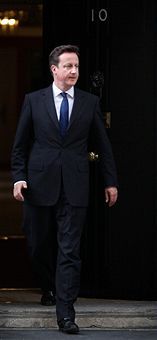 You certainly can’t fault David Cameron for his perseverance. Six years after pushing
the thinking behind the Big Society in his pitch for the Tory leadership, and
three relaunches of the idea later, he is still at it in a speech today. He will, apparently, stress that the Big Society is not some nebulous nothingness — but, rather, “as gritty and
as important as it gets”. And as if to underline the point, the PM will announce some solid new measures to bolster his grand projet, such as £40 million of extra funding for
volunteering.
You certainly can’t fault David Cameron for his perseverance. Six years after pushing
the thinking behind the Big Society in his pitch for the Tory leadership, and
three relaunches of the idea later, he is still at it in a speech today. He will, apparently, stress that the Big Society is not some nebulous nothingness — but, rather, “as gritty and
as important as it gets”. And as if to underline the point, the PM will announce some solid new measures to bolster his grand projet, such as £40 million of extra funding for
volunteering.
Cameron is, I suspect, making this case for two main reasons: to counter criticism of his Big Idea and to present a sunny flipside to the cuts, cuts, cuts. But an accident of timing adds to the resonance of this speech. It was only last week that one of the Cameroons’ favourite intellectual lodestars, the New York Times columnist David Brooks, wrote an article on the Big Society that captured what most Conservatives and Liberals think about it at the moment: that it is a smart, decentralising idea, but it fails as a retail proposition. Brooks didn’t cite it, but he may as well have published the Sun poll from January, whose results Alex summarised thus: “I don’t know what it is. It sounds like a good idea. It probably won’t work.”
One particular problem, as I see it, is that Cameron too often relies on the Big Society as his main good news story, to the detriment of some of his government’s other good news stories. The recovery in private sector jobs; the infectious spread of freedom throughout the state school sector; a reworked welfare system that rewards and encourages work — some of these have, at times, been crammed uncomfortably under the umbrella of the Big Society, or at least been overshadowed by it. But perhaps they ought to be pulled out and celebrated for their own worth. When it comes to voting, people tend to put the tangible ahead of theories of the state and civil society — however good those theories are.






Comments